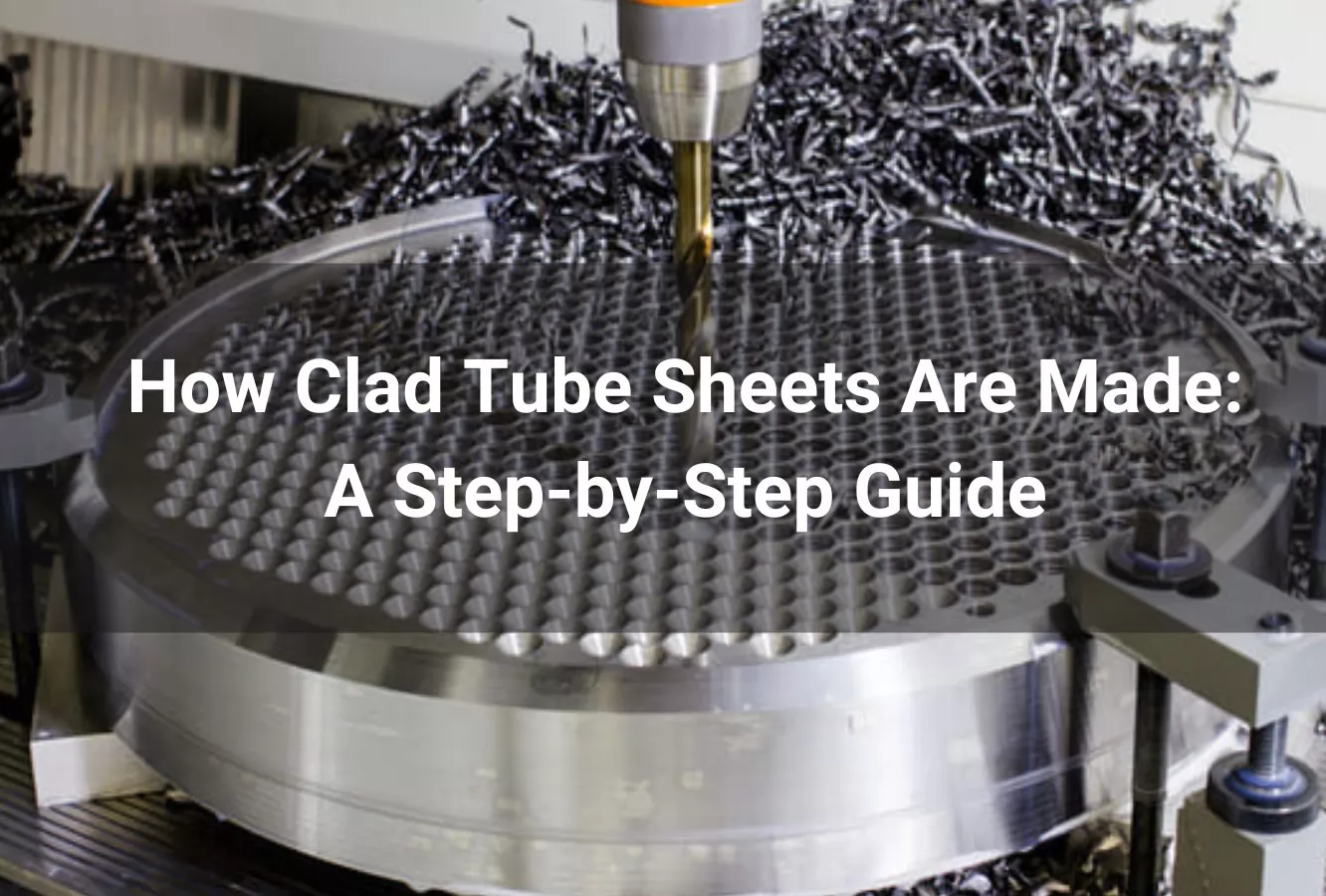


Clad tube sheets are essential components used in heat exchangers, pressure vessels, and other industrial applications, where durability, corrosion resistance, and strength are critical. These sheets typically consist of a high-strength base metal, such as carbon steel, and a corrosion-resistant overlay, like stainless steel or titanium. The combination of materials provides excellent structural strength and resistance to harsh environments, making clad tube sheets vital in industries like chemical processing, oil & gas, and power generation.
In this step-by-step guide, we'll walk you through the process of making various types of clad tube sheets, including Stainless Steel Tube Sheets, Titanium & Titanium Alloy Tube Sheets, Nickel & Nickel Alloy Tube Sheets, and Copper Alloy Tube Sheets.
The first crucial step in making a clad tube sheet is selecting the right materials for the base metal and cladding. Here's an overview of the materials commonly used:
Stainless Steel Tube Sheets: Stainless steel is widely chosen for its excellent corrosion resistance, particularly in acidic or corrosive environments. It's typically used for heat exchangers in industries such as chemical processing.
Titanium & Titanium Alloy Tube Sheets: Titanium and its alloys are often used in environments where high resistance to both corrosion and heat is required. These materials are ideal for seawater or other harsh, corrosive fluids.
Nickel & Nickel Alloy Tube Sheets: Nickel and its alloys are well-known for their ability to withstand aggressive environments, including extreme temperatures and highly corrosive chemicals. These tube sheets are commonly used in industries like petrochemical and power generation.
Copper Alloy Tube Sheets: Copper alloys, including bronze and brass, offer excellent thermal conductivity, making them an excellent choice for heat exchangers used in applications like HVAC and marine industries.
Once the materials are selected, both the base material and the cladding material are cut into sheets of the required size. These plates undergo a thorough cleaning process to remove any contaminants, such as oils, rust, or dirt. A clean surface is vital to ensure that the bond between the base and cladding materials is strong and reliable.
The plates are often treated using methods such as sandblasting or acid-washing to achieve a smooth and contaminant-free surface.
In this critical step, the cladding material is bonded to the base metal to create a durable, corrosion-resistant surface. There are several methods available for cladding, each suited to different material combinations and requirements:
Explosion Welding: In this method, the cladding material is placed on top of the base material, and an explosive charge is detonated to fuse the two metals together. This technique is particularly effective when the base and cladding materials have significantly different properties, ensuring a strong and reliable bond.
Hot Rolling or Hot Pressing: Here, both the base metal and cladding are heated to a high temperature and then pressed together under significant pressure. The heat causes both materials to soften, enabling them to fuse into a uniform, strong bond. This method is ideal for achieving precise, controlled cladding thickness.
Both processes ensure that the cladding material—whether it's Stainless Steel, Titanium, Nickel Alloys, or Copper Alloys—is securely bonded to the base metal, providing the final product with enhanced strength and excellent resistance to corrosion.
After cladding, the clad tube sheet undergoes a heat treatment process to further enhance the bond between the base and cladding materials. The sheet is heated to a specific temperature to relieve stress and improve material integrity. This ensures that the cladding layer is fully integrated into the base material, increasing the overall strength and durability of the tube sheet.
For materials like Titanium & Titanium Alloys or Nickel Alloys, heat treatment also helps reduce any potential brittleness caused by the cladding process.
Once the base and cladding metals are bonded, the tube sheet is precisely machined to meet the required specifications. This step involves cutting the sheet to the correct diameter, thickness, and shape using advanced machining technologies such as CNC machining, laser cutting, or water jet cutting. The holes for the tubes are also drilled at this stage.
The machining process is essential to ensure that the tube sheet fits perfectly into the heat exchanger or pressure vessel, with precise hole spacing and dimensions. The cladding layer, whether it’s Stainless Steel, Titanium, Nickel, or Copper Alloy, is also carefully shaped to ensure the tube sheet functions as intended.
Once the tube sheet is fully formed and finished, it undergoes a series of quality control checks. These checks include dimensional inspection, visual examination, and non-destructive testing (NDT), such as ultrasonic testing or X-ray inspections, to detect any internal flaws or defects.
For tube sheets made from high-end materials like Titanium, Nickel Alloys, or Copper Alloys, additional tests might be carried out to ensure the bonding integrity of the materials and confirm their strength and corrosion resistance.
After the tube sheet passes all inspections, it is ready for final assembly. This may include attaching additional components such as tube supports, gaskets, or custom fittings. The tube sheet is then carefully packed for shipping, ensuring it arrives safely at its destination.
The manufacture of clad tube sheets involves multiple stages, each critical to ensuring the final product performs reliably under extreme conditions. From the careful selection of materials like Stainless Steel, Titanium & Titanium Alloys, Nickel & Nickel Alloys, and Copper Alloys, to the cladding, heat treatment, and machining processes, each step ensures the tube sheet will provide corrosion resistance, and durability. If you’re looking for high-quality, custom-made clad tube sheets, be sure to work with Fugo Tech who specializes in these advanced materials and processes to meet your specific application needs.
If you are looking for a trusted Chinese supplier, please contact us now!



Fugo Tech is focused on the manufacturing of clad metal plate and distributes the Stainless Steel, Titanium, Nickel Alloy, Zirconium and other non-ferrous metal pipes, fittings, flanges, and fasteners.